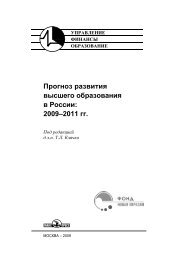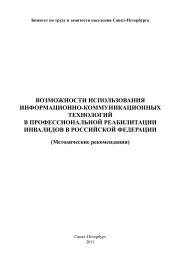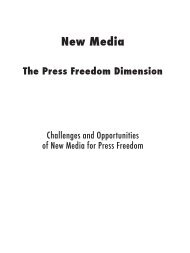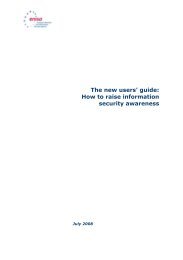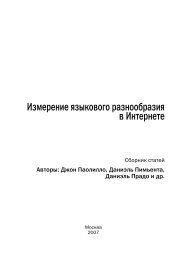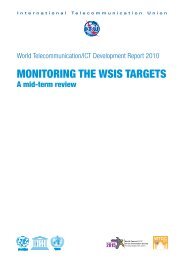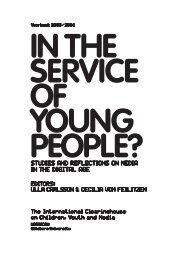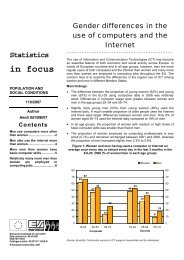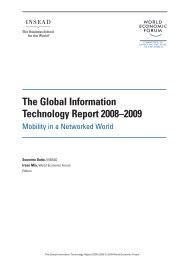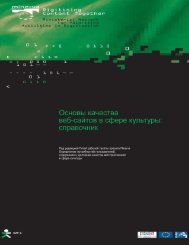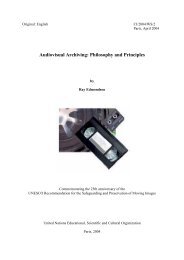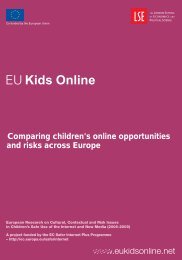Creative Economy: A Feasible Development Option
Creative Economy: A Feasible Development Option
Creative Economy: A Feasible Development Option
- No tags were found...
Create successful ePaper yourself
Turn your PDF publications into a flip-book with our unique Google optimized e-Paper software.
A. ECO-FASHION INDUSTRYEco-fashion, using textiles made of organic, natural andrecycled fibres, has become a new trend. The textiles are handloomed or made from rain-fed natural fibres such as organiccotton, silk, hemp, jute and bamboo. Production processes inthe eco-fashion industry are non-polluting or less polluting,and often use very little energy other than human creativity,talent, and skills. In addition to using natural materials, ecofashionhighlights local identities and cultures, ethnically aswell as ethically. The clothes come from fair trade, meaningthat the people who make them are paid a fair price and havedecent working conditions. Furthermore, eco-fashion productsare bio-degradable or easy to recycle, critically desirablefeatures given that a substantial portion of our landfills arecomposed of cheap, throwaway clothing. Under the eco-ethicalfashion concept not only environmentally damaging productionprocesses should be avoided but also the over-harvestingof wild species for their skins or natural fibres. It shouldbe noted that various processes in textile, leather and otherfashion-related manufacturing like jewellery, cosmetics andperfumes use toxic chemicals and produce effluents which canpollute air, water and soil. For instance, worldwide cotton nowaccounts for 11 per cent of pesticides and 25 per cent of allinsecticides used each year, while organically grown cottondoes not involve the use of chemicals that can cause speciesdamage. 82 A success story of how the eco-fashion industry hashelped improve lives and environment is presented in box 2.11.2The development dimensionBox 2.11Eco-ethical fashion and natural fibresIn 2007, the World Conservation Society and Edun, an apparel company founded by Ali Hewson and her partner Bono, lead singer of the rock band U2, establishedthe Conservation Cotton Initiative in order to improve the livelihoods of communities in Africa by investing in sustainably harvested cotton. The programpromotes development of eco-friendly cotton farming around high biodiversity areas to enhance incomes and economic development, improve resourcemanagement and protect wildlife. Edun’s ethical T-shirt brand, Edun Live, produces organic cotton T-shirts that are not only popular in retail outlets, but at U2concerts worldwide where they are sold in partnership with Hard Rock International, creating mass public awareness and financial support for organic cottonfarmers in Africa. In partnership with MADE-BY, a non-profit organisation whose mission is to improve environmental and social standards in the fashion industry,Edun, under its trademark Edun Live, produces “grow-to-sew” T-shirts in sub-Saharan Africa. MADE-BY has assisted Edun in achieving compliance withinternational standards for lawful, humane and ethical manufacturing, as well as in installing a wastewater treatment facility in its Ugandan plant.Sources: Wildlife Conservation Society WCS and the Conservation Cotton Initiative, and Pesticide Action Network UK. Uganda Cottons On – A WearOrganic Newsletter special focus onUganda’s cotton tradeAt the January 2010 UNCTAD international seminaron Redefining Sustainability in the International Agenda, 83jointly organized by UNCTAD’s BioTrade and <strong>Creative</strong><strong>Economy</strong> Programmes in association with the NGOGreen2Greener, a group of committed eco-fashion professionals,including the London Fashion Association, proposedan action plan to set the basis for a meaningful legislation tomake sustainable fashion the norm by 2030. The proposedGreen Action Plan calls for:■Legislation to give the Fair Trade and Organic Marks credenceand to give designers tools to create a sustainableindustry and education programmes;■■■■A fund to support farmers and the textile industry in developingcountries the means to create a system which honoursand rewards the sustainable use of organic farming methodsand maintenance of biodiversity from field to stitch;Goals for all natural fibres to be grown in an organic andsustainable manner by 2020;All polyester and synthetic production to be from sustainablymanaged and recycled sources by 2030;Reduced energy consumption within the textile and garmentmanufacturing industry by a minimum of 30 percent, monitored by an energy plug. In addition to haveenergy outsourced from renewable energy sources such as82UNCTAD (January 2010).83In launching the celebrations for the United Nations 2010-International Year of Biodiversity, UNCTAD organized three related eco-oriented events, in January 2010 at the Palaisdes Nations in Geneva. An international seminar was attended by over 500 participants, the Eco-Chic Fashion Show featured more than 50 looks donated by 40 world-famousfashion designers and sustainable fashion labels, and exhibited by 30 top models. For two weeks the Eco-Chic Exhibition showcased products that provide eco-benefits and incomefor small communities in developing countries. The exhibition’s world tour will culminate with the Eco-Chic Fashion Show and Exhibit at the UN <strong>Creative</strong> <strong>Economy</strong> Week to beheld from 19-22 October 2010 in the context of the activities of the United Nations Pavilion at the Shanghai World Expo 2010.CREATIVE ECONOMY REPORT 201067



